I’m a traveler, nearing my 10 year mark on the road and if there’s one appliance I’ve grown to HATE in my camper, its the refrigerator. And… if you knew me personally, you’d figure I’d really LIKE the refrigerator!
Allow me to begin by stating I’m NOT an expert tech on refrigerators, but I think after years of major issues off and on with them, I’ve gained some sense of these beasts and as a fellow RV’er or RV traveler, my views might just be worth hearing. That said, (and here’s the “company line” – do not attempt to work on your RV fridge on your own.) With that said… read on –
There are two (well now, THREE) RV Refrigerator Manufacturers
These are companies who specialize in making refrigerators for RV campers and I hold precisely NONE of them in high esteem! In fact, if I may be so bold, I’d say in a moment of candid honesty – they all suck. For the record, I’m talking about Norcold, Dometic, and Furrion. Furrion is a division of Lippert (LCI).
What do RV’ers REALLY want AND expect from their refrigerator?
A refrigerator section that RELIABLY stays below 40F and a freezer section that stays cold enough to keep the ice cream firm – is that really too DARN much to ask? Now I’ll admit, RV refrigerators have a few additional unique requirements:
- Function over a wide range of temperatures (from well below freezing to over 100F) and variable humidity
- Function reliably in a vehicle that travels at 60+ mph over roads that at times can be pot-holed and wash-boarded gravel
- Function safely so they don’t act to set the rest of the camper ON FIRE!
- Draw limited power (the ultimate resource in a camper – especially when “boondocking”) so you don’t wake up to DEAD batteries!
Hey RV fridge manufacturers… ARE WE REALLY ASKING TOO DARN MUCH?!
What prompted this HIGHLY WARRANTED ATTACK on ALL the RV fridge manufacturers?
I have a gas absorption fridge, primarily the domain of Norcold (mine) and Dometic. AND… it is riddled with problems. See below for a general overview of this type of fridge. But first, here’s my story (and this all occurred over the course of SEVERAL weeks) and some lost frozen food…
The (most recent) problems with my Norcold started in early June with my freezer “losing its cool.” I discovered this when I awoke to thawed food in my freezer and unsafely warm food in my fridge. Temperatures in the freezer rose to the 30’s to near 40; the fridge was 50+.
My first attempt at a solution was to turn it off for 3 days, fully defrosting it*, at the same time, I applied petroleum jelly to all seals (gaskets) to ensure an airtight fit when the doors closed. When I fired it back up and in mere hours, the freezer was down to about 10F and the fridge was in the 30’s. All good, right? NOPE!! It was not to last.
I was staying in Edgemont, SD, and the weather was admittedly hot (near 100F on SOME afternoons, and strong sun on the back of the fridge from 1pm to late afternoon due to the alignment of my camper in the rv site. After a couple of days of NORMAL performance, I awoke to the freezer temperature having risen back up to the high 30’s (in the interest of brevity, I will limit my comments to just the FREEZER temperatures.)
*Defrosting your fridge: 1) do NOT use a hair dryer as it can damage the delicate walls of the fridge 2) when ice melts on the back wall, it may NOT be all done melting – ice can accumulate BEHIND the wall. You need to allow time for that ice to melt. You’ll know when the drip tray (outside back of fridge – see image below) stops collecting water.
So… with some outside guidance and help, I replaced the control board. Result? No change, a couple of days of normal performance, then boom – back to a warm freezer; I again reset the fridge (turned off for several hours then restarted) and installed a new thermistor – started it up, again – back to cold, then after a day or two – warm again. After another day or so hiatus, I restarted the fridge after placing a shop fan outside the fridge, with the outside cover removed and with strong air blowing across everything, the fridge resumed and HELD normal behavior.
Tech visit #1: He firmed up the upper baffle; verified the fans above the cooling unit were functional (they’re designed to come on when a thermostat reads heat); and added a fan on a switch down low to increase air movement. Turns out the fan he installed was simply not enough air flow – so… initially cold after restarting and then back to warm. AND despite the fans above the cooling unit testing ok, they were still not coming on when they were (apparently) needed.
Tech visit #2: No more reliance upon the thermostat! Wired the upper fans to the switch added by tech #1. Update: about 10 days later – the issue appears to be solved! The fans running continuously are keeping temperatures at reasonable levels inside the fridge & freezer.
This is now my constant companion inside my camper – simply because I don’t trust my rv fridge…
As you read on, you’ll learn who “tech #2” is (HIGHLY recommend) and why my next move may be to succumb to getting a new cooling unit (cost $1500 or so) IF the fridge acts up again.
At any point did I call Norcold? Nope! Why? I KNEW I’d get the COLD SHOULDER since they STRONGLY discourage rv’ers from doing ANYTHING on their own and to ONLY contact a Norcold trained specialist – the nearest one from me was about 100 miles… so, a “house call” (mobile service) would be prohibitively expensive.
Some (hopefully helpful) info on RV refrigerators…
Gas Absorption Refrigerators
These beasts have been in use for many years – and you’d think by now Norcold and Dometic could get it right!! Frankly, as an RV’er, at this time gas absorption refrigerators are your best choice AND the worst choice.
Huh?
At this time, they’re your BEST option if you plan to do any dry camping (boondocking) as they use power sparingly when working off the 12v/propane system. When connected to “shore power” (120v), they run off electric. BUT they do NOT function like a residential fridge.
A complex ammonia mixture produces the cooling effect in these fridges. An expensive, delicate and UNRELIABLE cooling unit is mounted on the back of the refrigerator box (the part you see inside your camper.) These cooling units don’t like extreme cold or heat and require ventilation (on the back) so all RV’s equipped with them, have a lower and an upper vent to let air flow through the cooling unit.
Full details on how a gas absorption fridge works can be found here.
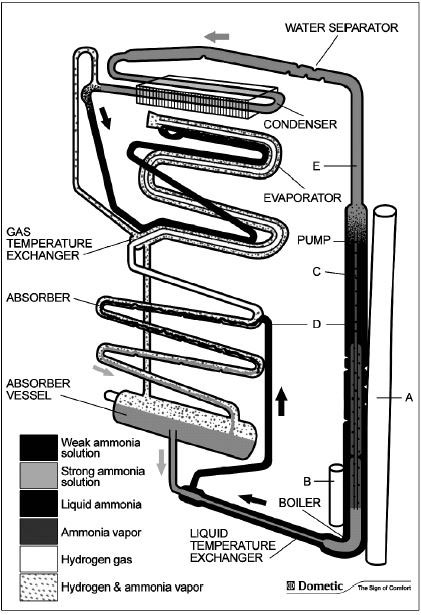
In a previous camper, I had my Norcold’s cooling unit fail and I may be experiencing the same problem again as I’ve struggled through WEEKS of troubleshooting in my current camper. Incidentally, this is why I’m a fan of extended service contracts as the prior cooling unit failure cost over $3000. to fix and this one may be over $1500.
That said, I’ve invested over $700. in my current Norcold attempting to trouble-shoot its behavior. There are really only four major components in a gas absorption fridge – the cooling unit, the heating element, the control board and the thermistor. Again, I’m NOT an expert and I know far more than I ever WANTED to know about these things!
In my case, I purchased and replaced the control unit (about $150.) and thermistor (about $27.) – neither fixed the issue (not staying cold consistently.) The heating element is apparently working, and its hard to believe the cooling unit has failed (or is failing) as the fridge CAN get to 10F and hold it for a few days (especially when I maintain consistent air flow to the back of the fridge using a shopfan to blow air on it – a real elegant solution, eh?)
To be honest, I didn’t mind purchasing a control unit & thermistor as I figured as a full timer, I’d need them eventually if not now!
As noted earlier, as part of my attempts to solve the problem were to have a fan added. There are two additional fans above the cooling unit that are SUPPOSED to come on (they’re controlled by a thermostat) when it gets hot – they DO work, but they seem to not be coming on soon enough. So… if all goes according to plan, later today, I’m having a tech named Jere in Sundance, Wy. add a manual override to the thermostat so I can turn on the upper fans when I decide its needed. Update: Jere added a jumper wire from the thermostat to a manual switch – so it now controls 3 fans – time will tell if this is “just what the doctor ordered.” Update 2: several days later – it appears that having the upper fans running all the time did the trick. The freezer is typically remaining at or below 20F. The fridge has held 40F or just under. Of course, an ongoing question is WHY this summer? Its NO hotter than prior summers and this is the 1st (as my camper nears 4 yrs. old) to require this approach to keeping the fridge cold.
*DEFROSTING Gas Absorption fridges: Ice tends to collect and grow on the back wall of the freezer (and BEHIND the back wall.) To defrost, turn off the fridge, leave doors open and BE PATIENT. Use of a hair dryer to speed the melting process is NOT recommended as the walls of the freezer are EASILY damaged. There’s a drip tray in back (outside) of the fridge, when water STOPS collecting in that tray, all the ice is then melted.
A VERY SOLID Mobile RV Repair guy I can recommend…
Jere of Meadowlark Trailer (307 281 2336) in Sundance, Wy. (Crook County) just opened his doors a couple of months ago and I’m glad I met him. He just finished adding a manual override to the upper fans in the back of my fridge. As a repair guy, he possesses several characteristics I truly appreciate – he’s honest, his pricing is fair, he’ll come to you to do the repairs, AND he’s humble – that is – he knows what he knows and knows what he doesn’t know – and he’ll be open with you as to whether he can do the work you need or not. I definitely encourage you to call upon him, he’s located just down the road from the Mountainview RV Park (very nice park) in Sundance, Wy.
I’ll keep you posted on my fridge saga, but in the meantime, lets talk alternatives…
Residential Refrigerators
A few years ago, RV manufacturers started slapping residential fridges into RV campers. I always questioned the wisdom of this. To my (limited) knowledge, these fridges have NOT been engineered to function trouble free for years in the “rolling earthquake” that represents a RV camper on the move. Further, they require 120v to function. Since RV’s are not always connected to “shore power” or are running their generator (if they even have one), all RV’s equipped with a residential fridge also have an inverter.
The inverter’s job is to convert 12v to 120v to run the fridge. This means (on paper) the fridge can run off your 12v battery system. The catch? They draw enough power to suck the batteries dry fairly quickly unless you’re recharging the batteries with solar panels (or a generator.) Solar panels charge the batteries directly, the generator (or shore power) charge them through a converter (which takes 120v and converts it to 12v and sends it to the batteries to recharge them.)
I have yet to see a residential fridge manufacturer find a way to reduce the power demand to a point where the batteries can power the fridge for any reasonable length of time. So… to my Concierge RV Buying clients, I only recommend residential fridges if they plan to camp in campgrounds with accessible shore power the vast majority of the time. Otherwise, my recommendation has been and for the moment (read on) continues to be to live with the gas absorption beast.
The best arguments in favor of a residential fridge include: they’re spacious (typically several more cu. ft. than a traditional RV fridge), they’re cheap (so if they fail, its not a big expense to replace them), and they’re NOT outside temperature sensitive. So… they shouldn’t freeze up in extreme cold (as gas absorbers can and do) or freak out in extreme heat. Of course, even though they’re cheap to replace, it does NOT necessarily mean they’re easy to get in/out of your camper!!
A possible NEW and VIABLE alternative RV refrigerator design
The three RV manufacturer “specialists” – Norcold, Dometic and Furrion have all recently (in the past two years) released 12v Compressor Refrigerators. They’re NOT subject to venting requirements as with the gas absorption units and they’re NOT sensitive to outside temperature variations – BUT – they’re in their early stages of use and STILL have issues (in my view) that require resolutions before I’ll buy one.
From what I understand – these refrigerators have two issues at this time:
- they tend to frost up and make a mess when defrosting
- they go through a cycle periodically that creates an unacceptable power demand so RV’ers with these fridges COULD wake up with deeply depleted (or dead) batteries.
I’m no engineer, but it would seem to me that BOTH of these issues ARE able to be overcome IF their manufacturers are serious about manufacturing a trouble free product. AND… once they are – I’ll be the first in line to DUMP my gas absorption beast! Just hazarding a guess, I’d bet we’re within a year or two of overcoming these issues. If you, the reader, know more than I on this issue (and that’s ENTIRELY possible!), please use the comments below to enlighten me and other readers.
Since the three stooges (Norcold, Dometic, Furrion) are all working on developing their version of these fridges, I’d hope the end product is solid as they (at least in theory) know where the fridges are going to be installed – and what the RV environment is like that they’ll need to function within. But for now, we are where we are.
Your thoughts? I’d love to hear ’em – you can post below! As well as subscribe to my newsletter to be advised of new posts below.
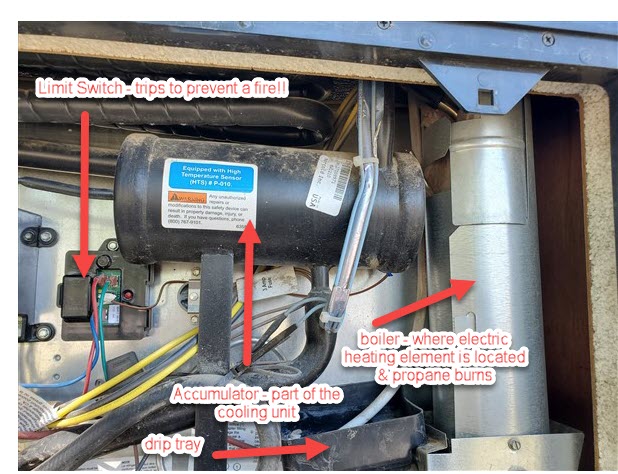
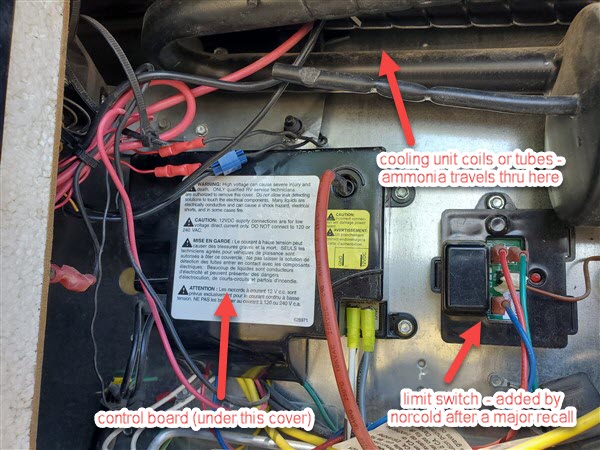
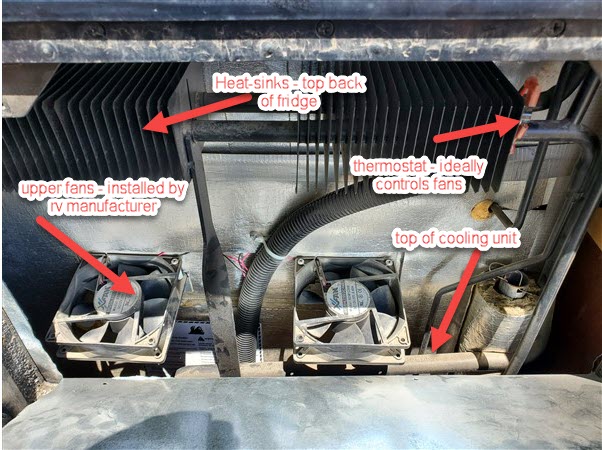
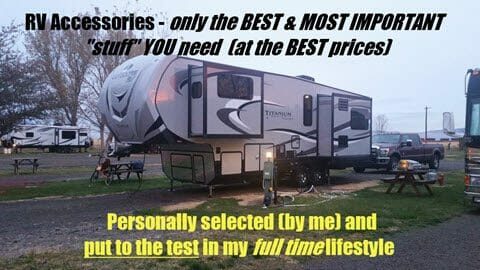
Fridge Fix of NJ specializes in repairing Sub Zero, Viking, Wolf & Cove appliances. As a Sub Zero Factory Certified installer, Fridge Fix is highly skilled in repairing, restoring, and installing all models of built-in refrigerators and wine coolers.
on the back of the refrigerator I see all of the pics of the different lines but none showing which line is the propane
if you’re not sure, hire an rv tech to do the work for you. Propane is nothing to fool with if you’re not sure.
Fridge Fix of NJ is your Sub Zero, Viking, Wolf & Cove repair specialists. Fridge Fix is a Sub Zero Factory Certified installer. Sub Zero can repair, restore and install all makes of built in refridgerators and wine coolers.
This company’s presence here does not represent an endorsement from RV Across America.
Norcold is truly a piece of crap. New 5th wheel in 2021. First fridge failed, 2nd fridge failed, 3rd fridge failed. This is my first trip with 4th fridge and I must keep frozen water bottles in fridge to maintain temps. Freezers are great. A deep cycle marine battery will last 30 hours while on propane. This is my 3rd 5th wheel that includes years of traveling and 20,000+ miles. The first 2 worked perfectly. I now own a $70,000 piece of trash camper. Grand design extended my warranty twice but who cares when you own a camper that can’t be reliably used. This is exhausting. I would love a reliable solution.
Update your norcold to a 12 volt compressor unit – either with the upgrade kit (offered by jc refrigeration), OR, buy a similar “foot print” fridge (norcold makes them) that are 12v compressor design. Have you had other issues with your Grand Design? Is it a 2021 model? Al
It is 2021 and yes, I’ve had other problems. Slide not aligned and chewing up worm gear, awning lights fell off on 3rd use, and a bunch of small stuff I repaired myself. In the 1st 450 days of ownership, it spent 165 days at the dealer. Very frustrating. I take it back this Thursday for a new hot water heater. Dealer didn’t winterize it correctly when they had it for 90 days last fall. The hot water tank flow meter froze and busted. Corporate has been reasonable but no one should have to go through this. They did give me $2000 cash and an extra 1 year warranty.
Part of the problem (at least) is it’s a “covid camper” – that is, it was built when lots of staff were out due to the virus. Quality on all assembly lines suffered as temporary staff were hired to work the assembly line and the final result was campers like yours. Your best bet is to sell it off and replace it with a better built camper. I am in a position to help via my Concierge RV Buying and Selling Service – https://rvacrossamerica.net/buysell (You can also do far better than Grand Design for the kind of money you spent.)
My Norcold N10 refrigerator won’t shut off freezer – 40 refrigerator 0 degrees and still running I called Norcold and they won’t talk to you
Of course they won’t talk to you! Are you a certified (and trained) Norcold technician? THAT is the ONLY people they talk to. Don’t mess with it. Call a certified tech OR replace it with a 12 volt compressor unit. Since its still working, I’d see about getting it fixed. Your message is not clear. Are you saying 40F in the fridge and 0F in the freezer? If so, you’re near ideal. Is the weather where you are very cold?
All out-of-date info
As a tech myself, I sense a leveling issue at the root.
Now we have 12 Vdc compressor type refrigerators, it’s a whole new world 250-300 watts on a Danfoss compressor
Add to that a jackery 400amp hour lithium polymer storage and 400 watts of solar panels ( 2 high-efficiency panels) you have a forever boondocking solution ( 5 YEARS UNINTERRUPTED).
The Chinese refrigerators last a year.
The modern RV meant for long-term boondocking is using chest-type refrigerators , two of them one as freezer and one as a fridge , there are expensive versions that have both sections.
Example
ICECO VL60 Dual Zone Portable Refrigerator with SECOP Compressor, 60 Liters Platinum Compact Refrigerator, DC 12/24V, AC 110-240V, 0℉ to 50℉, Home & Car Use (with Insulated Cover) https://a.co/d/hglM2x0
These are the future of off grid camping
You can mount them on slides.
Or you can get a home refridgerator and a inverter, the amonia cycle burns now expensive propane , solar pannels can be aquited cheap still and lithium iron battery packs.
This is a 5 year solution, we will look whats happening in 5 years to update
Thank you for your highly critical and INaccurate review of my article. If you re-read my article (or read it perhaps for the 1st time), I DO discuss 12 v compressor fridges and note that they’re new – and since they’re offered by companies with a sketchy track-record (norcold, dometic…), I hesitantly offer them as a POSSIBLE solution. Further, the fridge you link to in your comments, is an $850. 60 liter cooler – it in NO way can provide the same capacity travelers need as can be provided in a 10-15 cu ft fridge/freezer.
Oh, and not to mention – the MAIN purpose of my article was to highlight the issues with gas-absorption fridges which are STILL DOMINANT in campers that are “on the road” and in service TODAY. The issues i’ve had (and an extra fan installed late last summer has relieved the situation to a great degree) ARE and WILL BE experienced by many. Outdated info? I think not sir.
I won’t even go down the road of addressing the issues with your suggested 400ah lithium batts. All that said, hey, have a great day, and thanks for reading (sort-of).
Oh, and lastly, my leveling was and is dead-on. Al
Bought my RV in November last year. Turned on the fridge for the first time in May. It took maybe 10 minutes for the thing to catch fire. Destroyed the RV, caught my house and my neighbors house on fire. Screw norcold.
Wow – what year was your RV? Who is the manufacturer/model?
Once again, a lot of very useful information. Thanks!
thank you! al
Good article. Thank you